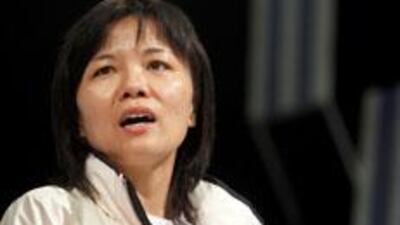Erwin Huang is a respected power broker in Hong Kong's business community, which is just as well for him, because he'd never make it as a rubbish collector.
The 46-year-old jewellery executive was taught a hard lesson in low-paid work as part of a hit television show that turns some of the financial hub's wealthiest people into its poorest labourers for a few days - sparking a ratings bonanza.
Despite wearing a mask, apron and rubber gloves, Huang nearly passed out from the stench of the rubbish he was tasked with dumping, and after just a few hours threatened to resign from his temporary job, for which he was being paid the equivalent of about Dh22 a day.
"It's very stinky … I need some fresh air. I can't take it anymore," Huang complained to his unimpressed supervisor.
"Look at my hands, they are swollen. It's because of the dirty water. This is very hard. I'm dizzy, I need some time to rest," he groaned.
Huang's hapless performance was broadcast on The Battle of the Poor Rich, which has soared in popularity since its 2009 debut. Some of Hong Kong's mega-rich have appeared on the show as janitors and sweepers, scrambling for their next meal while sleeping in the city's infamous cage homes - tiny cubicles that rent for about Dh735 a month.
The wealthy volunteers take part in the reality show - which highlights the plight of the city's poorest - to experience another side of life while hoping to boost their flagging public images.
Huang, the chief executive of Tse Sui Luen Jewellery at the time, found his small quarters too much to bear in Hong Kong's stifling heat, so he opted to sleep on the street instead.
"I know some people think it's funny seeing these millionaires sweep the floor," said Doris Wong, the executive producer for the show, which has seen its weekly ratings soar from about 64,000 viewers during the first season to 1.2 million in the second season, or about 17 per cent of Hong Kong's seven million residents.
The city is usually associated with laissez-faire economic policies and the super-rich, whose ranks expanded by about 33 per cent last year, exacerbating Hong Kong's wage gap - already one of the developed world's largest - and contributing to a rising tide of anger as poor and middle-class residents struggle to afford homes amid soaring property prices. Once-admired tycoons are more often vilified, including its wealthiest man, the property magnate Li Ka-shing, who has been nicknamed "Superman" for his business prowess.
For the financier Johnny Chan, collecting cardboard was an "eye-opening and humbling experience", far from his lucrative job in Hong Kong's financial district.
"When I was on the show, I felt so empty and scared - it was hard living as a cardboard collector," said the 39-year-old father of three.
Although dozens of the city's wealthy have (temporarily) forsaken their luxurious lifestyles and Brooks Brothers suits to live in poverty, Wong said it was increasingly tough to find new participants: "Some of them fear that they will be seen as hypocrites - of doing this show instead of really wanting to help."
However, Michael Tien, a politician and the owner of the popular clothing chain G2000, which has outlets in Abu Dhabi and Dubai, said his time sweeping the city's streets "wasn't tough at all". But he admitted to getting lost on public transport - he usually has a chauffeur.
For Tien, who started his street-sweeping duties at dawn and earned just enough to buy prepackaged meals at convenience stores, it was a positive experience.
"Society's view of me has changed," he said. "People on the street have come up to me and thanked me for caring about them ... I'm a much happier person after the show."
Critics of the show cast doubt on whether anyone can fully understand living in poverty after just a few days, but participants are quick to defend the city's elite.
"A lot of wealthier sectors of society actually do a lot for the poor," said Chan, citing a new charitable fund started by Li. "It's just that a lot of them don't publicise it or have a film crew following them around."
"We are laying seeds for change," said Wong. "Hopefully we are changing the mindset of one rich person at a time."

